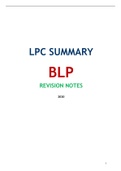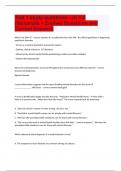Why philosophical background of qualitative research important?
Important to know that there is no single accepted way to do such research
How to do research depends on a lot of factors beliefs, funders, goal of research,
characteristics of the participants
Some methods are particularly used for one philosophy (maintaining consistency)
Characteristics defining qualitative research:
Naturalistic, interpretive approach
Concerned with exploring phenomena ‘from the interior’ (innerlijk)
Taking the perspectives and accounts of research participants as a starting point
What, why and how questions (rather than how many)
Methods observation, semi-structured interview, depth-interview, focus groups
Data not numbers, but words or photographs
Definition Denzin & Lincoln = a set of interpretive, material practices that make the world
visible. These practices transform the world. They turn the world into a series of representations,
including field notes, interviews, conversations, photographs, recording and memos to self.
Qualitative research study things in their natural settings, attempting t make sense or interpret
phenomena in terms of the meanings people bring to them
Beliefs about the nature of the social world and what there is to know about it ontology:
Whether or not there is a social reality that exist independently of human conceptions and
interpretations
Is there a shared social reality or only multiple, context specific ones?
Two positions:
1. Realism = there is a external reality which exists independently of peoples beliefs
and understandings of it distinction of the way the world is and the meaning and
interpretation of that world held by individuals. Variants:
Naive/shallow realism reality can be observed directly and accurately
Cautious realism reality can be known approximately or imperfectly
rather than accurately
Dept/critical/transcendental realism reality consists of different
levels (empirical domain experience through sences, actual domain
bestaat ongeacht het wordt waargenomen, real domain underlying
processes and mechanisms
Subtle realism external reality exists, is only known through the human
mind
Materialism recognizes only material features, such as economic
relations. Values/beliefs are epiphenomena, that features are from, but do
not shape the material world
2. Idealism = reality is fundamentally mind-dependent only knowable through the
human mind and through socially constructed meanings no reality exists
independent of these. Variants:
Subtle/contextual/collective idealism social world is made up of
representations constructed and shared by people in particular contexts
Relativism/radical idealism there is no shared reality
Beliefs about the nature of knowledge and how it can be required epistemology
How can we learn about reality? What forms the basis of our knowledge?
Induction = bottom-up process, patterns are derived from observations of the world
(evidence conclusion)
Deduction = top-down, logically derived hypotheses are tested against observations
(conclusion evidence)
Reproductive logic identifying the structures that may have produced patterns, try
different models for a fit
Abductive logic using researchers categories, from participants own accounts of
everyday activities, ideas or beliefs
Variants:
Foundational vs fabilistic models foundational assumes it’s possible to mirror
reality accurately. Fabilistic treats all knowledge claims as provisional (voorlopig)
Value-mediated all knowledge is affected by the values of the person who
produces or receives it






